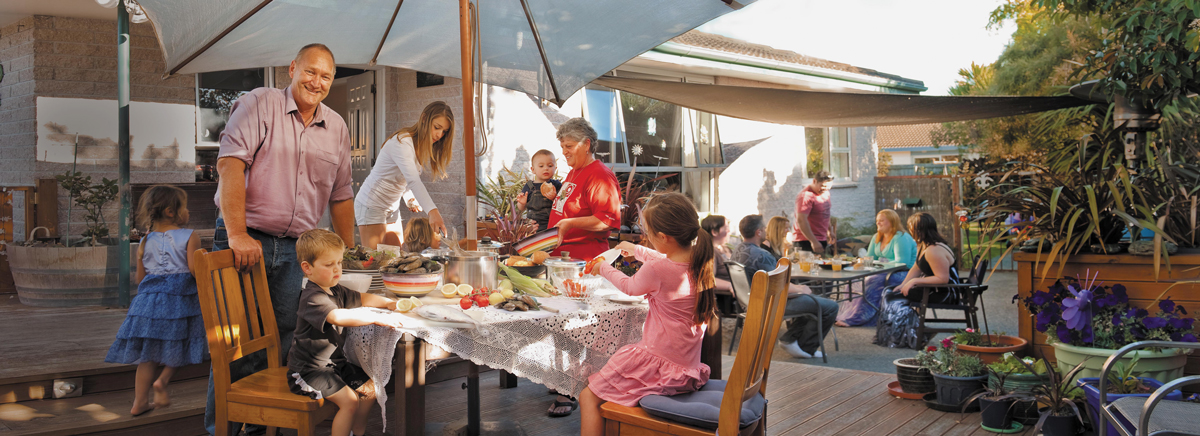Walking the talk
Mar 31, 2017

Nā Mark Revington, Adrienne Rewi and David Slack
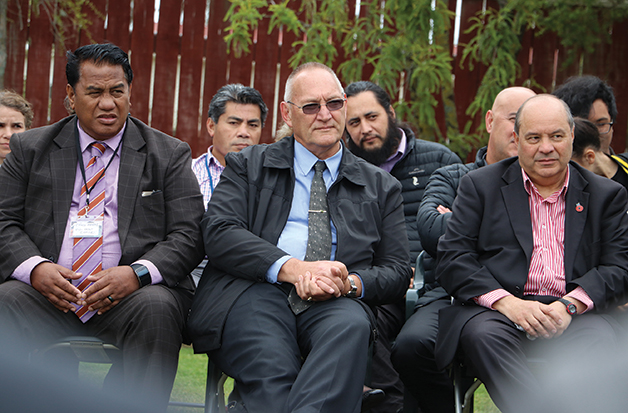
Taku Parai (Ngāti Toa Chair) Tā Mark Solomon and Te Kenehi Teira at Iwi Chairs Forum in Blenheim, 2016.
Tā Mark Solomon is not the kind of man who speaks at length about himself. He values his privacy and he’s prone to under-playing any suggestion that he’s made a significant contribution to Māoridom, to Ngāi Tahu.
The fact that he was knighted in 2013 in recognition of the work he has done for Ngāi Tahu and for Māoridom is a case in point. His initial reaction was to baulk at the honour, but there were those who told him to “pull his head in,” that it wasn’t just for him, it was for the tribe. He relates how he was told firmly to “get up there to Wellington and receive the honour on behalf of the tribe.”
The day after tangata whenua and manuhiri celebrated his honour at Takahanga Marae, Tā Mark was up at 5am to catch a plane to Australia for a speaking engagement at a conference – proof, if it was ever needed, of just how much time he devoted to the iwi.
As he leans back in his chair in the family home he has shared with his wife Maria, their four children, and their whāngai son for the last 38 years, Tā Mark (Ngāi Tahu, Ngāti Kurī) is reserved. He’s reflective and he’s clearly thinking through the sort of brief, articulate response to questions that has characterised his 18 years as Kaiwhakahaere of Te Rūnanga o Ngāi Tahu.
It hasn’t always been this way. In the beginning, Tā Mark – or “just Mark” as he was known then – was tongue-tied and terrified. He still vividly remembers the blinding panic when called upon to speak on behalf of Ngāi Tahu just after he was elected as kaiwhakahaere, on one of the biggest days for the iwi.
He was called upon to do the whaikōrero at Pipitea Marae in Wellington on behalf of Ngāi Tahu that afternoon. There was one small problem, he says. He reckons his grasp of te reo Māori was simple at best. Others may say it was close to non-existent. He remembers a feeling of abject terror.
He adds that the next day when he arrived at Parliament there were television crews and over a hundred people waiting to be welcomed. He was told it was his turn to speak.
“I bumbled my way through the pōwhiri,” he says.
“I was terrified. I finished and then twigged that I hadn’t acknowledged all the rangatira from other tribes who had come to tautoko Ngāi Tahu and they’re all standing together.
“I was bright red. I went up to them and one of them was Api Mahuika. ‘Uncle,’ I said, ‘I’ve come to apologise for not acknowledging you being here to support Ngāi Tahu.’ Api looked at me with a big smile on his face and said, ‘Oh boy, we could see the tūtae running down the back of the legs’, which immediately brought me back to earth.”
It was also that afternoon when he realised the goodwill which existed in the highest echelons of the government.
“When we did the hongi and the harirū at that pōwhiri … when I got up to Jim Bolger (then Prime Minister), he had his business card in his hand, and slipped it into mine and said to me, ‘My private number’s on there, any support or help you need, ring whenever you like.’ It was the first time I ever met Jim Bolger.”
Born in Ōtautahi in 1954, Mark initially worked as a foundry metal worker before being elected as the representative of Te Rūnanga o Kaikōura in 1995. His first meeting with Te Rūnanga o Ngāi Tahu was at Taumutu in 1995.
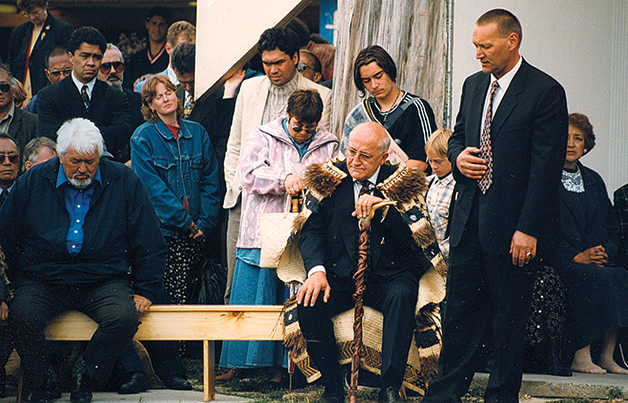
Tā Mark speaking at the signing of the Ngāi Tahu Deed of Settlement in Kaikōura, 1997 alongside Bill Solomon (far left) and Tā Tipene O’Regan (centre).
“The first person to walk up to me there was George Tikao. He introduced himself and said, ‘You know, we are close relations. It is an honour to have you with me – sit at the table beside me.’ I was also told that day by Cath Brown and Ruahine Crofts that they were my mentors, and that they would look after me. That was my first meeting,” he says.
Mark Solomon was elected to the position of Kaiwhakahaere of Te Rūnanga o Ngāi Tahu in 1998, having been nominated by Puketeraki and Waihōpai rūnanga, and supported by Ōraka Aparima. It was a role he would hold until the end of 2016.
Tā Mark has always been big on addressing the issues. He’s known for his passion for the Iwi Chairs Forum, which he helped establish in 2005. He is highly regarded for the attention he has brought to addressing family violence; and he makes no secret of the fact that re-establishing Māori trades training after the Christchurch 2011 earthquakes gives him a special sense of pride.
The election came just days before the third reading of the Ngāi Tahu Claims Settlement Bill in Parliament, with the iwi watching on. It was one of the first treaty settlements, the passing of Te Kerēme, and a resolution of sorts to seven generations of struggle.
He looks back on his first three years in the role as an introduction of sorts.
“I was just getting out and meeting people,” he says.
He was still a smoker back then, and could often be found during hui either out on the roadway, or out the back of marae, having a puff.
“Get out the back, talk to the cooks – that’s when you hear all the issues,” he says.
Tā Mark has always been big on addressing the issues. He’s known for his passion for the Iwi Chairs Forum, which he helped establish in 2005. He is highly regarded for the attention he has brought to addressing family violence; and he makes no secret of the fact that re-establishing Māori trades training after the Christchurch 2011 earthquakes gives him a special sense of pride.
He has been a staunch supporter of iwi development and the education and self-empowerment of rangatahi; and he has been a powerful voice in the recognition of Māori business and the hefty contribution it has made – and continues to make – to the New Zealand economy.
Tā Mark’s colleague on the Iwi Chairs forum, Ngāti Whātua iwi and community leader, Naida Glavish, describes him as extremely well-researched, and a brilliant leader and speaker.
“He also cares enough to address the issues that others wouldn’t dare address. For instance, Mark would speak strongly about domestic violence, whether that domestic violence is right under his nose or under someone else’s.
“He is a decent person caring about his whānau in particular and about community in general. It doesn’t matter whose community, he actually does care.”
From his first tribal hui in 1988, two years after Te Kerēme was filed, it has always been about people. Along the way he has become an enormously influential figure and he acknowledges that it has been “an amazing journey across the whole of Māoridom.”
“It’s been a huge eye-opener. I’ve met a lot of amazing people, both Pākehā and Māori.”
Kaumātua Kukupa Tirikatene (Waitaha, Ngāti Māmoe, Ngāi Tahu), also known as Uncle Kū, says what has surprised him about Tā Mark is that aroha for all people. “He thinks and cares about everyone.”
Ngāi Tahu kaumātua Ranui Ngarimu agrees.
“Tā Mark is unassuming, forward-thinking and caring for all. Those qualities are all wrapped up in his cloak of humility,” she says.
“At the same time he has a measured yet very determined approach to everything he does. There’s nowhere that was better evidenced than during the Christchurch earthquakes. He was very determined that Ngāi Tahu and Te Rūnanga o Ngā Maata Waka should be included in all decisions that affected our people.”
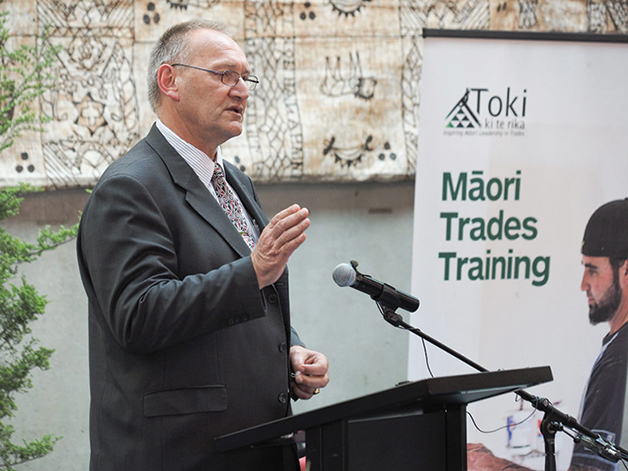
Tā Mark addressing the crowd at He Toki ki te Rika graduation in 2013.
It was that determination, she says, that let other organisations know that Ngāi Tahu had a lot to offer and, along with Te Rūnanga o Ngā Maata Waka, could reach multiple communities.
“He was determined and tenacious, and the assistance the two organisations offered during the quakes turned out to be one of the most helpful things Civil Defence could have had.”
In line with that, many believe that the tragic earthquakes of 2010 and 2011 enabled him to show his leadership qualities in a way that some may not have experienced previously.
The Minister Responsible for the Earthquake Commission, Gerry Brownlee, testifies to Tā Mark’s calm head in a crisis, and the concern for people he showed after the quakes.
“When so many were tested he sure as hell stood up. I think he’s an extremely honest man, in my experience, deeply committed to the wellbeing of Ngāi Tahu.
“The earthquakes have provided us with an unprecedented opportunity to design a cityscape that acknowledges our shared past, our shared experiences, and our common future.”
Tā Mark Solomon
“Over the last six years he’s been on the speed dial and a very reliable source of advice. He has a mana to him that just conveys solid dependability, and I think that a lot of people in Canterbury and in Christchurch in particular have not only noticed that but taken some strength from it. He’s been an extraordinary leader. He articulates powerful ideas in very understandable terms and he has, in every sense of the word, great mana,” Brownlee says.
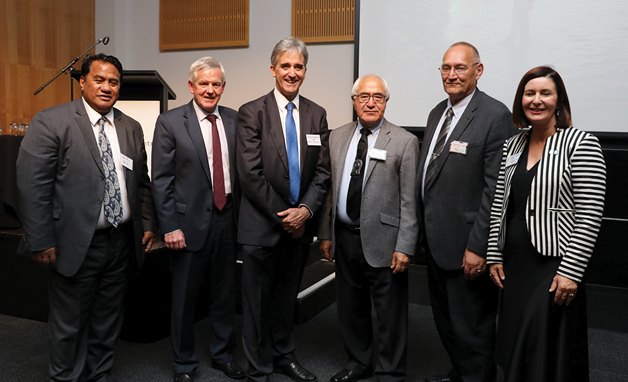
Left to right, Taku Parai (Ngāti Toa Chair), John Leggett (Malborough Mayor), Richard Kempthorne (Tasman District Mayor), Waihaere Mason (Ngāti Kuia Chair), Tā Mark Solomon and Rachel Reese (Nelson City Mayor).
The Christchurch earthquakes may have been a tragic natural disaster but when, as a result of new post-earthquake legislation, Ngāi Tahu was made a statutory partner with CERA (now Ōtākaro Ltd) and began actively taking a partnership approach, working closely with Christchurch City Council, it was a major step forward for the iwi.
Academics called the legislation “globally unique”, and Tā Mark said it was the best expression of the Treaty relationship he had ever seen.
“The earthquakes have provided us with an unprecedented opportunity to design a cityscape that acknowledges our shared past, our shared experiences, and our common future,” he said at the time.
“It’s a known that there are two stories that belong to the heritage of this nation, and for a long time only one of those had dominated. I think with the new legislation, we realised the potential of what we can achieve when we share a common experience and belief,” he says.
“To survive in today’s fast-paced world, Māori and the wider community, need to consider a much broader range of ideas about leadership. Leadership to me is about empowering our people – allowing them the space to identify their own needs and the time to come up with their own way of addressing those needs, to improve their lives.”
Tā Mark Solomon
One of the key markers in Tā Mark’s journey as Kaiwhakahaere has been his contribution to the Iwi Chairs Forum. In the group’s early years of the establishment, Tukoroirangi Morgan (Tainui) remembers Mark seeking the support of Dame Te Atairangikaahu – “and she gave it willingly because she was an ardent supporter of rallying our people, advancing our social transformation, and collectivising our economic capability. I came in not long after and we had a very fruitful productive and solid relationship,” he says.
“Tā Mark always reminded the forum that demographically the country was in for some changes – that by 2050 the bulk of New Zealand’s tax-paying workforce would be made up of Māori, Pacific Islanders and Asians; and that we would need to be prepared for that.”
Tuku Morgan says Tā Mark is highly skilled in strategy and goal setting, drawing on the Ngāi Tahu success in housing, language restoration, and economic development.
“It was easy for us to set targets and build a road map. When we got into a scrum with the Crown around Whānau Ora and all those innovative transformation initiatives, Mark was a powerful ally. He’s calm and reasoned. Nothing seems to fluster him. He’s a details person and he mixes that with vision and strategic nous. ”
Naida Glavish agrees.
“He does his homework really well. At Iwi Chairs he’s got every agenda item researched and he’s able to articulate an iwi and, in particular, a Ngāi Tahu perspective on agenda items. He’s an amazing spokesperson for Ngāi Tahu, a brilliant leader.”
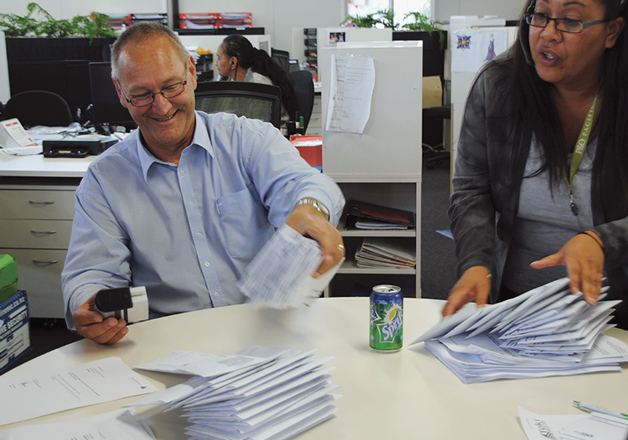
Tā Mark assisting Te Rūnanga staff member Sharon Karipa with a mail-out at the Wigram offices
It is his unswerving dedication to his leadership that Tā Mark will perhaps be best remembered for. Leadership is something he has been sought out for, something he has spoken about numerous times. It’s something he has strong views on.
“To survive in today’s fast-paced world, Māori and the wider community, need to consider a much broader range of ideas about leadership. Leadership to me is about empowering our people – allowing them the space to identify their own needs and the time to come up with their own way of addressing those needs, to improve their lives,” he says.
He talks about leadership being “ever-changing and evolving”, and he stresses the need to make sure we are growing our young people into the well-educated leaders we need them to be.
“It is vital that all iwi work with their young people to ensure our national kete is filled with future leadership talent. Our economy and the social fabric of our nation depends on it,” he says.
Tā Mark says leaders need to be able to stride confidently between multiple cultures – leaders who are as confident and comfortable on the global corporate stage as they are on the marae.
A strong leader is always willing to acknowledge those who have helped them along the way and Tā Mark is no exception. He has always spoken of his grandfather and his Uncle Bill Solomon with deep respect and affection.
“Leadership can be learned and developed through experience. I am an example of that. I wasn’t born to leadership. I had to learn to be a leader as an adult, and in doing so, I often looked back to my uncles and my grandfather – the men I turned to after my father passed away. They had a profound influence on my life. They showed me through example that leadership is all about whānau first.”
Tā Mark has devoted a good chunk of his life to the role of kaiwhakahaere, and is the first to admit that his own whānau have been incredibly tolerant of the time he has devoted to the iwi. In fact, his wife Maria was warned shortly after he was elected that the iwi would become his life, he says. They made a pact: she would bring up the family, and he would be in the service of the iwi.
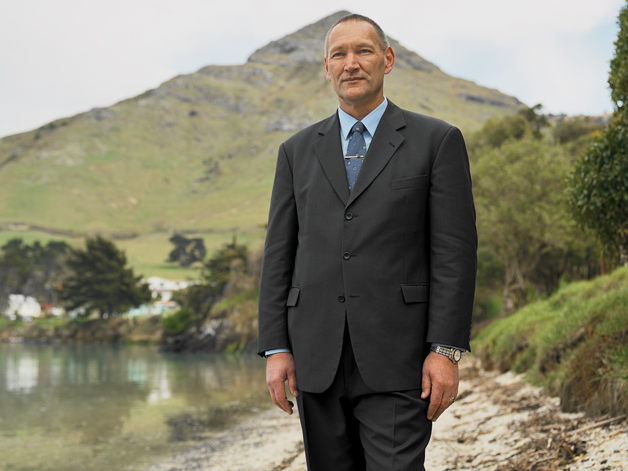
Tā Mark standing before Te Poho o Tamatea at Rāpaki.
“I could not have done it without the support of my wife, who was willing to put up with the hours that I do,” he said in 2013 at a ceremony at Takahanga Marae in Kaikōura to celebrate his knighthood.
Tā Mark may ultimately wish to let his deeds and achievements speak for themselves, but as Tuku Morgan says, “he has spread himself far and wide across this country in his own effort to help others,” and in light of that, he will always be remembered as a key figure in the rise of iwi Māori, as powerful contributors to both the New Zealand economy and to wider society.
Ranui Ngarimu has spent many years working with Tā Mark, and says one of his greatest contributions to the tribe has been his principles and his sense of justice in ensuring everyone in the tribe is treated fairly and justly.
“He really strove to make that happen. He has always taken an interest in everyone from the most successful people to the tamariki and the less fortunate, and although he’s donated a huge part of his life to the tribe, he’s always been a dedicated family man.
“He’s always walked the talk. That’s one of his greatest contributions, and what I admire most about him,” she says.
Like many others, Gerry Brownlee also praises Tā Mark’s selflessness, and wonders what may be yet to come. He notes that “there are plenty of other things that he will yet achieve.”
So what does the future hold? Tā Mark has been approached by four political parties, and has turned them all down. He chairs the Canterbury District Health Board, and has four other directorships. Beyond that he won’t be drawn, but there have been reports of gardening.
1954
Born in Ōtautahi.
1974
Married Maria and went on to have four children.
1995
Elected representative of Te Rūnanga o Kaikōura.
1998
Elected Kaiwhakahaere, Te Rūnanga o Ngāi Tahu.
1998
September: the Ngāi Tahu Claims Settlement Bill is passed into law.
Tā Mark observes the third reading after just days in the job.
Payout of $170 million received.
2001
Elected board member of the Museum of New Zealand Te Papa Tongarewa, a position he held from 2001–2007.
2005
Instrumental in setting up the Iwi Chairs Forum. Co-chair of Freshwater Iwi Leaders Group. In 2005, the first Iwi Chairs Forum was convened at Takahanga Marae in Kaikōura. The Forum meets four times a year at marae throughout the country to discuss and enable Māori aspirations in cultural, social, economic, environmental, and political development. The Forum is a platform for sharing knowledge and information between the tangata whenua of Aotearoa. Its primary focus is for participants to educate one another about what they are doing, how they are doing it, and how they can best support one another. The first hui had 36 tribes in attendance. Now, there are more than 70, and the Forum is recognised as one of most powerful lobby forces in the country.
2009
Tā Mark became an original member of the Minister for Māori Affairs’ Māori Economic Development Taskforce, established in 2009 and chaired by then-Minister of Māori Affairs, Hon. Dr Tā Pita Sharples.
The taskforce has seven key areas: tribal assets and collaboration, the primary sector, education and training, small-to-medium enterprises, social and community development, investment and enterprise, and economic growth and infrastructure.
2011
Played a key role in re-establishing the Māori trades training initiative, He Toki ki Te Rika, led by Te Rūnanga o Ngāi Tahu in partnership with CPIT (now Ara) and Hawkins. Patron of He Toki ki Te Rika.
2012
Named Visionary Leader of 2012 in the Deloitte and New Zealand Management magazine National Business Awards.
2013
Recognised in the 2013 Queen’s New Year Honours as a Knight Companion of the New Zealand Order of Merit for services to Māori and Business. Officially knighted in a ceremony on Friday 24 May, 2013 by the Governor-General in Wellington.
2014
Re- elected as Kaiwhakahaere for a three-year term.
2015
Received an Honorary Doctorate from Lincoln University as Doctor of Natural Resources, recognising his enduring interest and concern for our natural environment.
2015
Appointed to the National Science Challenge Governance Boards for Sustainable Seas and Deep South, which relate to ensuring our marine environment is understood and cared for, and understanding the role of the Antarctic in determining our climate and future environment.
2016
April: announces resignation as Te Rūnanga o Ngāi Tahu Kaiwhakahaere, to take effect in late 2016.
2016
Awarded the Kea World Class New Zealand Award, which celebrates the work of New Zealanders who make outstanding contributions to the country’s social and cultural development. The award is unique in that it recognises individual contributions to New Zealand’s success on the
world stage. Kea is the organisation that represents New Zealanders who work abroad.
2016
Champion for Tū Pono: Te Mana Kaha o Te Whānau, a pilot programme to explore ways of enabling stronger Māori responses to family harm and violence.
2016
A key driver in the establishment of and a signatory to the Children’s Covenant, with Naida Glavish and Judge Carolyn Henwood.
